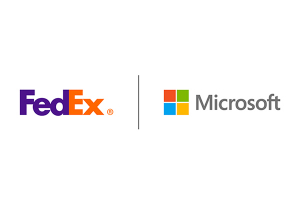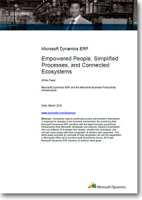Empowered People, Simplified Processes, and Connected Ecosystems
Companies need to continually evolve and transform themselves in response to changes in the business environment.
The landscape of business is changing rapidly, shaped by increasing globalization and heightened customer expectations.
To thrive, companies need to transform themselves into “dynamic businesses” that can identify new market opportunities and respond quickly to emerging customer needs.
But first, many companies trying to achieve this transformation need to adopt newer, more flexible IT systems. For many organizations, this means retiring complex and aging legacy systems in favor of newer applications that enable greater business agility and support simplified business processes.
Dynamic business is the vision that Microsoft has for companies that continuously evolve and transform in response to changes in their business environment.
These companies take advantage of flexible business systems that empower employees, simplify processes, and connect ecosystems of customers, partners, and suppliers. Microsoft demonstrates its commitment to this vision through the technology investments made in Microsoft Dynamics business management solutions. Microsoft uses the design principles of simplicity, value, innovation, and choice to guide these investments.
One area in particular where Microsoft Dynamics has focused is in designing its solutions to work with the Microsoft® Office system and Microsoft SharePoint® Server, the business productivity tools that millions of information workers use every day. This coordinated design delivers many benefits to businesses, including operational flexibility, efficiency, and productivity.
By connecting enterprise resource planning (ERP) solutions to business productivity infrastructure, companies empower their employees to make better-informed decisions in anticipation of events, not in reaction to them. Business processes are not just documented in binders on dusty bookshelves; they are presented to people contextually through the software tools that they rely on every day.
Companies can adjust their processes in days and weeks, not months. Moreover, steps in the process can proceed more rapidly as notifications, alerts, and workflow tasks are sent automatically to people’s e-mail inboxes.
Orders can be won, processed, and shipped sooner. Consumer and business-to-business Web sites can feature up-to-date information and self-service functionality based on business solutions, helping to build stronger connections among value chains of customers, partners, and suppliers.
What’s Related



Favorites





